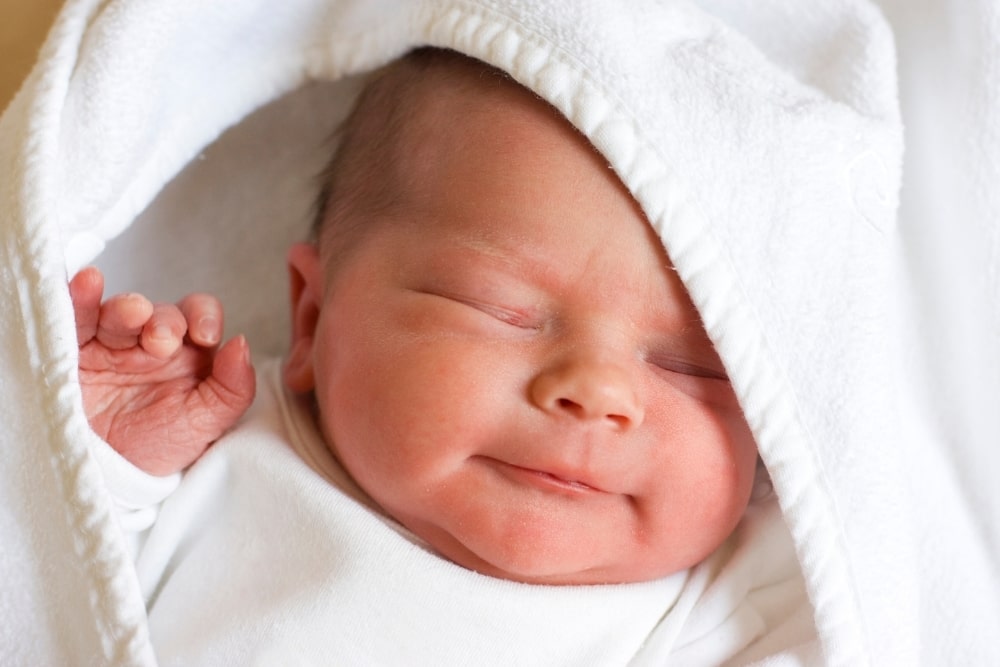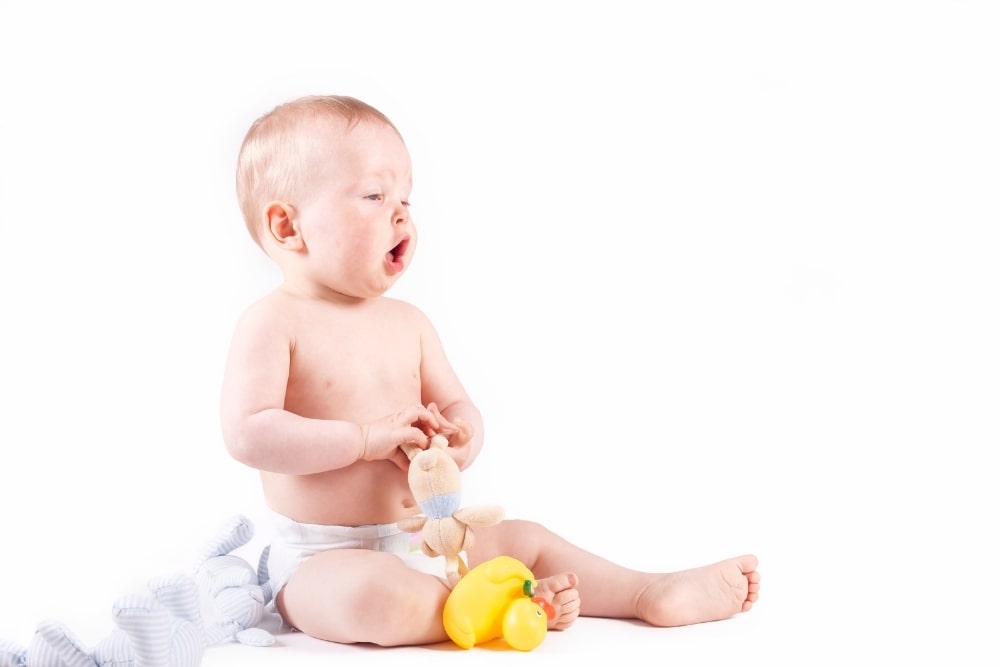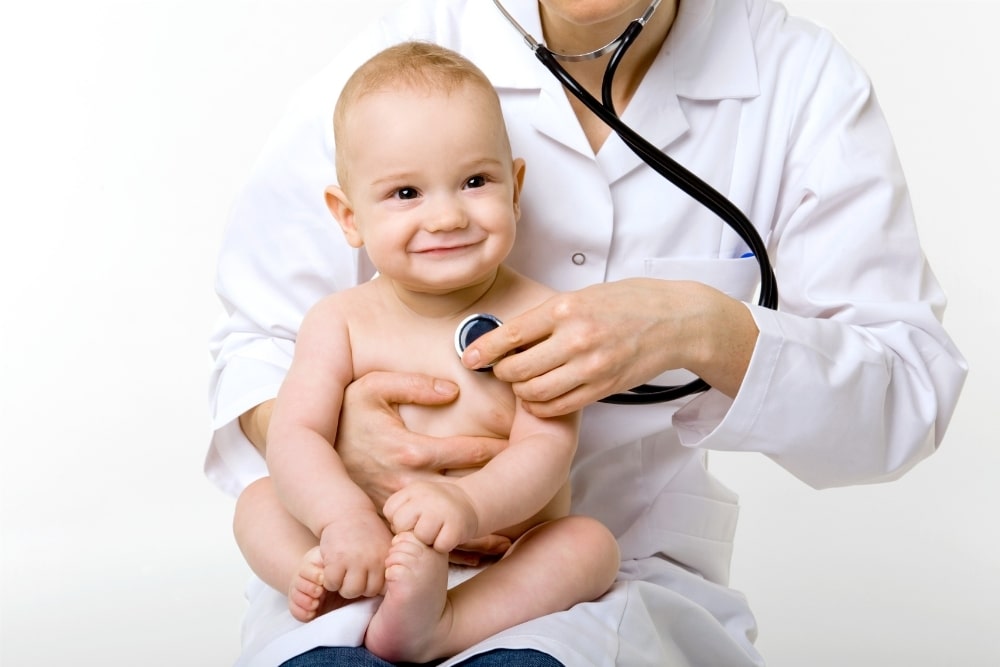When you’re new to the parenting game, you may question every move your newborn makes. Every twitch, every breath goes under your microscope as you wonder if what your baby is doing is normal.
While you don’t want to ignore any signs that could point to a problem, you also don’t want to panic over every little thing. We’re going to take a look at six common newborn behaviors that you don’t have to worry about.
1. Quivering Chin
Newborn chin quivers are at the top of the list of behaviors that get parents worried. If you see your baby’s chin shake and quiver up and down before feedings or after he’s been crying, don’t panic. This is normal.
These are primitive reflexes of the nervous system. Besides a baby’s quivering chin, you may also see your baby’s arms and legs start to tremble when they’re crying.
This is pretty common in newborns and typically should stop by the time they’re 1-2 months old.
When to be Concerned
If you notice your baby is quivering when they’re not crying, this could be a sign that something is wrong. If the jitteriness doesn’t stop and continues even when your baby is calm, call your pediatrician.
You’ll definitely want to do this if there are rhythmic jerking movements as well.
2. Squeaking Sounds
Some parents get anxious when they hear their baby-making squeaking sounds while breastfeeding. This may be due to a fairly common condition called laryngomalacia.
View in gallery
Here’s what happens. The tissue that’s just above your baby’s vocal cords might be very soft which causes it to flop into the airway when your baby breathes.
This can lead to a very minimal blockage of the airway which causes some noisy breathing. This is especially true when your baby is on their back.
Some parents notice that this sound gets louder and louder as their baby gets older. But as their muscle strength improves, the noises will go away.
When to be Concerned
If you feel that your baby is having trouble feeding and is not gaining the right amount of weight, you can check in with your pediatrician.
3. Eye Flutters
Generally, if you see your baby’s eyes fluttering this is an immature nervous system response. This can happen when your baby is drowsy, awake, or just starting to wake up.
Remember, you have a newborn. It’s going to take time for their vision system to fully develop and work like an adult’s eyes.
Some parents get worried as they watch their baby’s fall asleep and notice their eyes slowly rolling they open and close them. This is okay too.
When to be Concerned
If you notice other symptoms with the eye fluttering, you’ll want to call your pediatrician. This includes a sudden change in skin color, irregular breathing, inconsolable crying, or jerky movements.
4. Hiccoughs
Do you worry when you get the hiccoughs? Probably not. So, you shouldn’t worry when your baby gets them too.
View in gallery
When your baby swallows air or there is some overfeeding going on, the diaphragm muscle starts to spasm. This is what is believed to cause the hiccoughs.
You can decrease the chance of this happening by burping your baby more frequently during breastfeeding, especially when your baby has taken in milk quickly.
The hiccoughs are not something that’s going to go away. You can expect your baby to get them as they grow up, even when they’re adults. So, there really is no time to be concerned about the hiccoughs.
5. Catnapping
If you have friends whose babies nap for hours, you may think that there is something wrong with your baby because they only sleep for about 40 minutes.
But, some babies just wakeup easily after just a little bit of sleep. Although this can be frustrating because you want your baby to nap, it doesn’t necessarily mean that anything is wrong.
When you notice this catnapping pattern, you can watch from a distance to see if your baby can settle himself. Sometimes you may need to rub their back or soothe them.
Remember, they were in utero for nine months where they were constantly warm and nurtured. Your baby may just need some time to adjust to their new environment.
There no reason for concern but you can bring it up during your next pediatrician visit. They may have some suggestions to get your baby to sleep longer.
6. Sneezing
At the first sneeze or sniffle, many parents have their pediatrician on speed dial. Newborns sneeze as a way to clear their nasal and respiratory passages of congestion and airborne particles.
Sneezing can also help your baby reopen a nostril that may have been pushed close during breastfeeding. Once they’re done feeding, your baby may sneeze and take a breath to get both nostrils open.
When to be concerned
While many sneezes are nothing to worry about, there are times when you should be concerned.
If your baby has a runny nose, seems congested, has trouble breathing, or is running a fever, you’ll want to call your pediatrician to get your baby checked out.
View in gallery
It could be a sign of a cold or other illness. Once you can rule those out, you know those little sneezes are nothing to worry about.
The Big Takeaway
It’s hard to be a new parent because you don’t know which behaviors are cause for concern and which are normal. But, there are plenty that is no cause for concern.
As your baby grows, you’ll get to know more about their behaviors even though they can’t quite communicate their needs. Keep calm and parent on, you got this!






